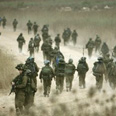
Ceasefire scenarios
IDF preparing for series of scenarios in Lebanon. According to one possibility, in which Katyusha fire will stop, IDF will leave Lebanon gradually by weekend. According to another scenario, in which fire exchanges continue, Israel will not want to withdraw with 'tail between its legs.' Another possibility IDF preparing for is expansion of operation after ceasefire falls apart
Where will the ceasefire bring us? Military sources are sketching a series of scenarios of developments on the northern border, some of them in the short term, some in the long term.
"There is definitely a lot more unknown than known here," a military source told Ynet. Such are the Israel Defense Forces preparations for the ceasefire and its future implications:
Scenario 1: The ceasefire will enter into force, Katyushas shootings will stop, and the fire exchanges between IDF forces and Hizbullah will dwindle. In such a situation, IDF forces will gradually leave Lebanese territory by the weekend. Reserve soldiers will gradually be released, but the IDF will leave a large number of soldiers serving their compulsory service along the northern border for at least a few weeks.
Such a situation will allow the IDF, in coordination with the political establishment, to plan the responsive and operational policy to prevent Hizbullah from gaining strength.
According to the new policy, the IDF will fire at every armed person coming within one kilometer of the border, as well as destroy the line of outposts and work-stations of Hizbullah.
"This policy will make it difficult for the Hizbullah to kidnap soldiers and collect intelligence. However, in order to prevent them from achieving what they achieved on the eve of war, we must undertake many other operations," said the military source.
Scenario 2: The ceasefire will only bring relative quiet to the northern border, with Katyushas occasionally being fired into Israel, and intense battles being developed within Lebanese territory. Israel will not want to withdraw with her tail between her legs and presence in Lebanese territory will increase.
"This may delay the deployment of the multinational force," explains the military source. "Such a situation needs thought. We have no intention of controlling the territory, but to allow the UN Security Council Resolution to be applied in the field."
Such a situation will freeze the release of reserve soldiers and the compulsory forces will remain in the zone. In practice, this is the most problematic scenario because on one hand there will be a certain relaxation, while on the other the fire will continue. Every significant military operation will be interpreted as a violation of the ceasefire agreement.
Scenario 3: Fire on the northern border will continue even after the ceasefire enters into force. Fire will be renewed even after a few days of quiet.
This situation, as bad as it seems, will give the IDF legitimacy to respond harshly in that Israel can announce that following the lack of respect for the agreement, Israel no longer sees the agreement as binding, and will renew her broadened operations in southern Lebanon. In such an instance, it will be taken for granted that not one soldier will leave the zone and that residents of the north will be forced to live in shelters or with relatives in the center of the country.
As of now, the IDF is giving Scenario 1 a chance, be it with great caution. In the instructions given to the troops that there is no damaging Hizbullah's infrastructure once the ceasefire is applied. Only if fire is opened on the troops, they are permitted to respond.










